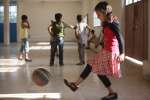- Text size
 |
|  |
|  |
| 
- Français
UNHCR chief urges Europe to help Bulgaria cope with Syrian refugee influx
News Stories, 22 November 2013
SOFIA, Bulgaria, November 22 (UNHCR) – UN High Commissioner for Refugees António Guterres pledged on Friday to help Bulgaria cope with an influx of Syrian refugees and called on other European Union countries to help shoulder more of the burden.
Guterres, speaking at a joint press conference with Bulgaria's Prime Minister Plamen Oresharski, announced that UNHCR would launch a programme to help Bulgaria meet the needs of several thousand refugees.
He said this would include building up the capacity of the State Agency for Refugees; deploying UNHCR staff or partners to help the government speed up the processing of refugee applications; and providing aid to meet the most pressing needs of the Syrian refugees. UNHCR will send a technical team to Bulgaria next week to assess the needs and decide on what kind of practical support is required.
Growing numbers of Syrian refugees have been making their way to Bulgaria via Turkey in recent months, but the country is ill-prepared or equipped to deal with the influx. Many of the Syrians are living in squalid conditions in hastily opened reception centres without sufficient food, warmth, shelter or access to health care.
"We cannot forget that these people have suffered enormously and it's totally unacceptable that they go on suffering once they reach the European Union," Guterres said earlier Friday after meeting Syrian refugees at the Vrazhdebra reception centre on the outskirts of the Bulgarian capital, Sofia. "It is a European responsibility to receive these people and to give them the kind of hospitality and solidarity they dramatically need," added the High Commissioner.
During a tour of the crowded former school, Guterres and Kristalina Georgieva, the European Commissioner for International Cooperation, Humanitarian Aid and Crisis Response, talked to the mainly ethnic Kurdish refugees about the conditions and their concerns.
Refugees spoke about the long delays in the processing of their asylum claims and the difficulty of surviving on an allowance of about one euro per day. Some were worried about xenophobia, while one tearful woman feared being returned to Syria if she did not receive asylum soon.
One family told Guterres and Georgieva that they had fled the violence in Syria two months ago and reached Bulgaria from Turkey after a four-hour hike through thick forest. Now they share a former classroom with two other families.
"What about our future? What will happen to us?," 41-year-old Fatma asked Guterres, echoing the thoughts of many of the refugees. "You have suffered already a lot, but you have to have a bit more patience," said Guterres, later adding that UNHCR would work with the authorities to improve the situation. "In Bulgaria, the facilities for reception of asylum-seekers clearly need improvement, but we were pleased to see progress already made," said Commissioner Georgieva. "I am confident that, with cooperation between Bulgaria and UNCHCR and with assistance from the European Union, the asylum procedures will speed up," she added.
The Vrazhdebna reception facility is one of seven accommodation centres for asylum-seekers in Bulgaria and currently hosts some 400 people, mostly Syrian Kurds.
At Friday's press conference, Guterres said European solidarity was vital in dealing with the growing refugee crisis – more than 2.2 million Syrians have fled their country, with most seeking shelter in Egypt, Iraq, Jordan, Lebanon and Turkey. Growing numbers are now trying to reach Europe by sea or land routes.
"It is very important that European countries all over the continent keep their borders open and [provide] adequate assistance," said the UNHCR chief, who also called on the Bulgarian media to show responsibility when reporting on the Syrians. "Refugees are not terrorists. They are the first victims of terror, the ones who suffered more because of terrorism," he said.
Guterres also discussed the new cooperation plan with Prime Minister Oresharski and other top officials. He also met President Rosen Plevneliev.
Bulgaria has received more than 8,000 asylum-seekers to date this year, compared to an annual average of 1,000 over the past decade. They include an estimated 5,000 Syrians and just over 4,100 of the total are living in government-run reception centres. The rest stay in private accommodation, having waived their rights to material assistance while their refugee claims are being decided.
By Ariane Rummery in Sofia, Bulgaria









































